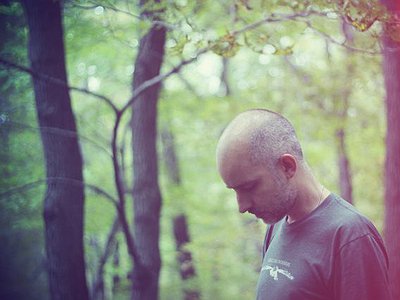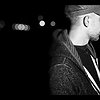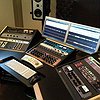Recording can be related to a particular location, but thanks to technology, it no longer has to be. How do you see the relation between sound, location and space?
It's pretty wonderful that there are such high quality and portable musical tools and technologies now. Music really can be written and recorded anywhere. I definitely prefer to do the bulk of my recording and mixing in my own studio with my complete set of tools, but I have absolutely taken advantage of portable technology to record and write in specific locations. With the idea of conceptual recordings, location becomes very important.
On my recent collaboration album with Seaworthy we did a lot of field recording in the forests and streams around my house, which was then mixed with recordings in the studio. The whole album was about the exploration of these surroundings. Simple processes like field recording are vital and can be done very easily in very high quality these days.
Location has been never been more important than with my Between CD on 12k. It was a meeting of not only friends, but also a very particular and amazing moment in time and location. We recorded spontaneously in a 200 year old Japanese building on this particular day, tour, and everything that was a part of our experience. This recording could not happen anywhere else for all of those reasons. If the five of us including Marcus Fischer, Simon Scott, Corey Fuller, Tomoyoshi Date and I, got together to make an album under different circumstances, it would have had a totally different outcome. The location, time and story unfolding around us were absolutely vital to the music.
In how far are the objective, universal and measurable parameters for what constitutes quality in a recording? What are currently your main challenges and ambitions in terms of your approach to mastering to further these quality standards?
Mastering to me is very personal. It can't NOT be personal, because I’m the one doing it. So when I’m mastering I try to achieve what I think sounds better, whatever that means. Maybe it's more space in the high frequencies, maybe it's a tighter, punchier bass, and maybe it's a narrow, more focused sound. It's totally subjective.
The hope is that MY vision and the artist's vision are in sync and we're both happy with the mastering. Fortunately this is the case 99% of the time. There are times, however, when I'm mastering a song and I think it needs one thing, but the artist doesn't agree. In this case it's my job to always do what the artist wants, it's their music after all, and they absolutely have the final say in the matter.
I don't think there are, or should be, any universal rules for what constitutes a good recording. It's so dependent on so many factors. An example that quickly comes to my head is Iron and Wine's The Creek Drank The Cradle. It's absolutely his best album in my opinion, and that happened to be recorded in very lo-fi means on a 4 track cassette. It's a far better album than anything he's done since, given his constantly increasing budget for recording expenses. Fancy studios and the greatest equipment mean nothing next to great songs, great sounds and passionate songwriting.
Tell us about your studio, please. What were criteria when setting it up and how does this environment influence the creative process? How important, relatively speaking. Are factors like mood, ergonomics, haptics and technology for you?
I’m actually building a new studio outside of the house. This began about two weeks ago and has been in the planning for over a year. It’s being designed not only for acoustics but also for comfort and vibe. Mood and ergonomics, to me, are as important as acoustics and more important than any technology. If I don’t want to create in a space, if I don’t feel inspired, then all of the technical perfection in the world won’t mean a thing.
But at the end of the day it is absolutely a balancing act between acoustics and design. The locations I really wanted to have windows, simply would not be very good acoustically, so window placement became very important and we did many redesigns of the back wall for the best acoustics. The toughest thing, ergonomically, is designing a layout that works both for mastering and my own songwriting.
I need to keep my main listening area as clear as possible of furniture that may cause negative acoustic reflections but at the same time I need access to my equipment. I think I have found the best way to balance that. I'm very excited about the construction. It’s going to be a beautiful, small building sheathed in rusted steel and cedar and hopefully inspiring the minute you walk through the door.
What do you usually start with when working on mastering a new piece?
The first thing I do is listen to the piece and make mental notes of what needs to be accomplished. After that I’ll usually begin with precise, subtractive EQ to even out any resonant frequencies that may be eating up a lot of space. Then I've got a well-balanced version that’s ready to go onto the more additive and sweetening types of process.
Of course, every song is different and requires different work, but this is a common way of starting for me. Lately I’ve been doing very little additive EQ. I find I can achieve the sound I want by cutting certain frequencies instead of adding others.
Certain sounds seem to be inextricably connected to particular genres or styles of music or even to different formats, like the CD or vinyl. Do you consider these as limitations, as a given or as a compositional tool which can be used in an inventive way?
I pay very little attention to genre or style classifications. They really mean very little to me and as such I'm not really concerned with where a sound may belong or not. All that is important is what sound works best in the composition at hand or what a particular song may need, sonically.
The line between production work and composition is blurring. In how much do you feel that these two areas could mutually influence and inspire each other?
I think this line has been blurring for a few decades now that high quality recording tools are available to everyone at home and even more so in the last 10 years. I think the roll of “producer” is pretty much something only used by those people who aren’t recording at home and that number is getting smaller as the years go by.
With experimental or electronic music, production techniques go hand in hand with sound design and composing. It’s all sort of the same thing now because the process has become so technical. For me, sound design and songwriting are nearly one and the same.





